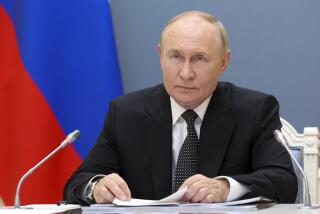U.N. Official Urges Probe of Alleged Russia Abuses
MOSCOW — The United Nations’ top human rights official, saying she was “shocked and appalled” by accounts of Russian atrocities in Chechnya, called on the Russian government Tuesday to establish an independent commission to investigate alleged human rights violations in the separatist republic.
After a three-day visit to the war-torn Caucasus region, High Commissioner for Human Rights Mary Robinson urged Russia to respond to mounting concerns in the West about Moscow’s conduct in the war by opening its own inquiry into charges of murder, rape and looting by Russian troops.
Robinson said she was horrified by the “accounts of Chechen civilians, many of them women, and by the utter devastation that has been visited on Grozny and other parts of Chechnya.”
For the most part, Russian officials have dismissed allegations of atrocities committed by their soldiers as Chechen propaganda and disinformation spread by Western media outlets. Last week, however, authorities arrested a Russian army colonel in the slaying of a Chechen woman who had also been raped.
Human Rights Watch, a New York-based group, reports that it has documented at least 130 cases in which Russian troops summarily executed Chechen civilians. Most, if not all, of the killings occurred while the troops were looting newly conquered towns and villages.
Robinson, who had asked to visit the sites of some of the worst reported atrocities, was not given access to all of the locations but was able to talk with civilians who said they had witnessed numerous atrocities.
“I listened to testimony of summary executions, intimidation, looting by military personnel, disproportionate use of force, attacks on civilian convoys, rape and other violations,” Robinson said. “These accounts corroborate much of the serious and documented information available so far, and they require a serious response.”
Russia has faced growing criticism in the West for the high number of civilian deaths in the conflict in Chechnya and for Moscow’s apparent unwillingness to investigate war crimes in the republic. The Council of Europe, the continent’s top human rights body, is expected to vote this week on whether to suspend Russia’s membership in the group.
In meetings with top Russian officials, Robinson said, she urged them to respond to international concern by creating an independent national commission with the authority to investigate the reported crimes in the war zone. Such an approach would be unprecedented in Russia.
Robinson had publicly expressed interest in meeting with President-elect Vladimir V. Putin, but he declined to see her.
Robinson held talks with other top officials, including Foreign Minister Igor S. Ivanov, who she said expressed interest in the idea of an investigative commission.
In his own statement later in the day, Ivanov took a more aggressive stance: He denied systematic abuses in Chechnya and said Russia will not permit other nations to dictate how to handle its internal matters.
“We will never allow this problem [the Chechen war] to be used as a pretext for interference into Russia’s domestic affairs,” he said.
Ivanov said Russia is trying to respond to international concerns and organized Robinson’s trip to Chechnya to give her a firsthand look at the situation.
“I cannot remember even one case in international practice in which a government of a country solving its internal problem would have been so open for cooperation with international organizations,” he said.
Robinson noted that the Chechens also have committed atrocities. But she defended her criticism of Russia by pointing out that the main focus of her agency’s work is to prevent human rights violations by government agencies and troops.
Robinson said she was moved by her meetings with Chechen refugees and by the sight of the destruction in Grozny, the republic’s capital, which was leveled by Russian bombs and shells.
“I found it very devastating to see Grozny itself, and I was very affected by the misery of the many people I spoke to and who appealed to me to be their voice,” she said. “I heard shocking accounts, truly shocking accounts. . . . There must be a day of reckoning with regard to the situation in Chechnya.”
More to Read
Sign up for Essential California
The most important California stories and recommendations in your inbox every morning.
You may occasionally receive promotional content from the Los Angeles Times.










